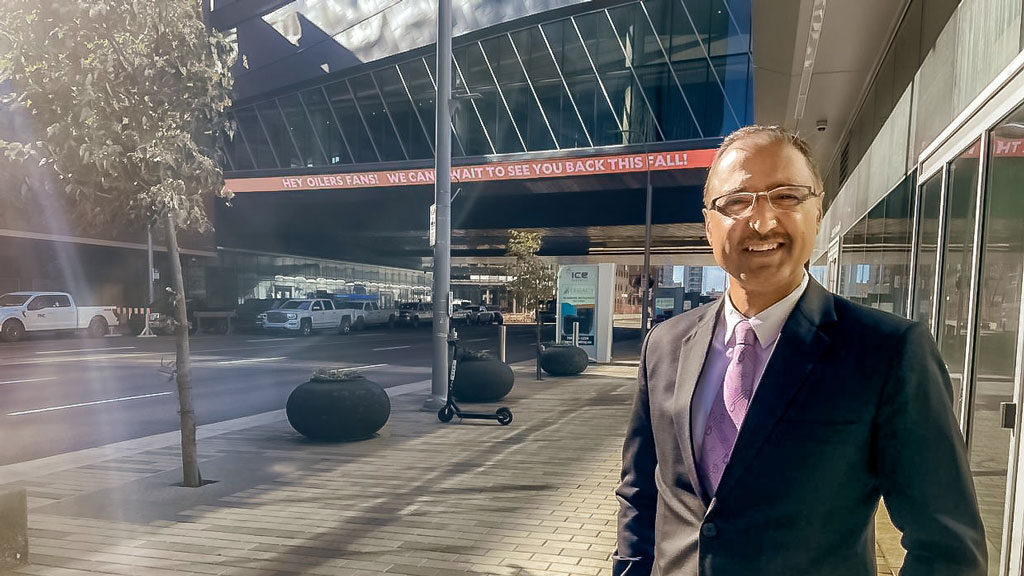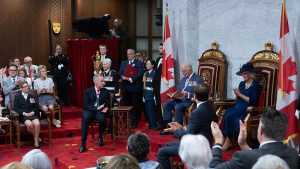As Edmonton enters a new year, the new mayor is looking at improving and reimagining the city’s infrastructure.
Edmonton Mayor Amarjeet Sohi previously served at the federal level as minister of infrastructure in Justin Trudeau’s Liberal government but said his interest in infrastructure began when he immigrated to Canada.
“As an immigrant to this country I benefitted a lot from community-based infrastructure like transit, libraries, recreational centres and other cultural facilities. I really understand the value, why well-functioning appropriate infrastructure is so critical for building dynamic places for all of us to live in,” Sohi said.
With the City of Edmonton projecting substantial population growth in the coming decades, Sohi said,
“You just can’t imagine a functioning city without a functioning roadway system, transit system or recreational facilities , libraries, fire halls, EMS stations, police stations – all those things that we don’t think about as critical and sometimes don’t even define as infrastructure but they’re so critical,” he said.
Sohi said the city has caught up on physical roadway infrastructure such as expanding the Yellowhead Trail Freeway over the next five years and fixing overpass rehabilitation, as well as catching up on LRT expansion.
“We were behind for decades in building the LRT in our city. Edmonton and Calgary started at the same time in the 1970s, we stopped but Calgary continued. Their system is larger and more integrated and now we’re catching up,” Sohi said.
“The southeast LRT will be operational this summer and then we’ll continue to expand into the west and the southwest and eventually into the northwest part of the city, so we’re catching up on that.”
Sohi said when he was elected to council 2007 the city was just starting discussions on rehabilitation of hundreds of Edmonton neighbourhoods.
At the time only one neighbourhood per year was being repaired, he said, so the city put together a dedicated tax levy for rehabilitation and “now we’re doing 15 neighbourhoods at a very high standard. I think this is a very good example of forward thinking, maintaining current infrastructure and making sure all amenities in the neighbourhood are provided.”
Downtown revitalization was a focus of the city, Sohi said, and significant progress was made to make the downtown core a more livable residential area before the pandemic began in 2020.
“Before COVID-19, Edmonton’s downtown was thriving. We were on the rise and invested a lot of money into public infrastructure to facilitate building of Rogers Place. That acted as a catalyst for a couple of hotels, residential towers, commercial buildings and couple that with the LRT connections and billions of dollars we were investing in that, and the revitalization of streetscapes,” he said.
“Unfortunately COVID-19 has left us behind and hopefully after COVID we’ll pick up from where we left off and move forward and bring back that vibrancy. That’s something I’m absolutely committed to making sure it happens.
“There’s a lot of work downtown that’s been happening and in surrounding neighbourhoods and it’s critical work.”
COVID-19 necessitates adaptation of existing municipal infrastructure, Sohi said, but it also means new ways of thinking for both the public and private sector.
“I think as we recover from COVID we need to start reimagining our public places and public buildings differently because there’s a lot of private sector empty space. How can we work with the private sector to create more space for cultural organizations or festivals or other needs? How do we maybe convert that commercial office space to more residential housing for downtown and other parts of the city?” he said.
“I think COVID presents us with challenges, but it also provides us with opportunities to rethink and reimagine those spaces.”
For more on digital media editor Warren Frey’s interview with Sohi, check out The Construction Record podcast this Friday, Jan. 21 here. (https://canada.constructconnect.com/joc/podcasts)
Follow the author on Twitter @JOCFrey.











Recent Comments